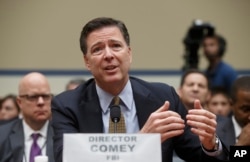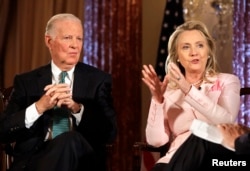Critics of former U.S. Secretary of State Hillary Clinton, the expected Democratic presidential nominee, have been questioning FBI Director James Comey's decision this week by not to pursue criminal charges over her use of a private email server while serving as the nation's top diplomat.
After Comey announced the findings of an FBI investigation into the matter and defended them before members of the House of Representatives, critics cried foul and the State Department reopened an internal investigation into the matter. At issue is whether Clinton mishandled classified information in a manner that amounts to an offense for which she could be prosecuted.
Comey said Clinton had been "extremely careless" in setting up a private computer server at home rather than keeping her email stored on a government computer designated for classified information. But he said he could find no evidence that she sought to violate U.S. laws on purpose, or covered up her actions.
Clinton's likely main rival in the U.S. presidential election later this year, Republican Donald Trump, tweeted in response to Comey's comments, "No charges. Wow! Rigged System."
Political pedigree
Clinton's critics, including some members of the House Oversight Committee who heard Comey's testimony Thursday, say Clinton got special treatment because of her political pedigree. Utah Republican Jason Chaffetz, chairman of the committee, said he was "mystified and confused" about how Clinton had escaped criminal charges. "If your name is not Clinton," Chaffetz said, "or you're not part of the powerful elite, then Lady Justice will act differently."
The chairman of the Republican National Committee, Reince Priebus, told conservative radio host Mike Gallagher on Thursday that Comey admitted in his report that Clinton had lied.
"James Comey announced to the world that Hillary Clinton is a liar," Priebus said. "I mean, she's lied about everything. ... Like about not having classified information [in her email] — a lie. She lied about saying she turned over all the emails [to federal authorities after leaving office]. Another lie. She lied about the fact that she never sent or received classified information."
But Comey drew a different conclusion, which he emphasized Thursday in his testimony: "We have no basis to conclude she lied to the FBI."
Political communications expert Lauren Wright said Comey made clear he did not believe Clinton intended to commit a crime, a big factor in a decision to prosecute.
No cover-up
A case often brought up as a contrast to the treatment of Clinton is that of former CIA Director David Petraeus, who resigned his post in 2012 after admitting he shared classified information with his biographer, who was also his lover, and lied about it to federal authorities. Asked about the retired four-star general, Comey said there was "clearly intentional conduct" and that Petraeus "knew what he was doing was in violation of the law."
Clinton's deeds may have been born of ignorance, the FBI director noted. He said Clinton was not "sophisticated" in the handling of classified information, and may not have recognized the symbol in her emails designating classified materials.
Although classified information turned up in email stored on her personal server, which authorities say was vulnerable to hacking, there was no evidence that she shared it with unauthorized parties on purpose and tried to cover that up.
Security clearance was another issue. Comey admitted during Thursday's hearing that FBI employees found to have misused classified information could suffer consequences ranging from a reprimand to outright dismissal. But he was carefully noncommittal when asked whether Clinton's actions would have affected her clearance if she had been an FBI employee. He said only that it would be "a very important consideration."
Wright, the political communications expert, said it is impossible to compare security standards at the FBI with those at the State Department.
"Each agency has a fair amount of autonomy," Wright said. "They also have a fair amount of discretion about how they deal with these things."
Clinton's use of a private email system was common knowledge among her aides at the State Department, Wright noted, and "since the State Department did have knowledge of the private server, and her co-workers had knowledge, it becomes a question of who should have flagged it and when."
Personal knowledge
In addition, Wright said, if Clinton's critics are really worried about her sharing state secrets, her emails are not the real threat; her personal knowledge is.
As a former secretary of state and former first lady — married to former President Bill Clinton, who held office from 1993 to 2001 — Hillary Clinton is "already a walking encyclopedia of classified information," Wright said. "Even as first lady, [she would] have access to highly sensitive information, just by the fact of their close relationship with the White House and staff."
Whether the controversy over the private email server will affect Clinton's run for the presidency remains to be seen. Wright, who has written a book on presidential spouses and communication strategy, said polling numbers this far ahead of the election have little bearing on how people will vote in November.
"Those polls are shaky even a week before the election," according to Wright, who conceded that questions about Clinton's judgment and trustworthiness are likely to swirl about her for the duration of the campaign.







